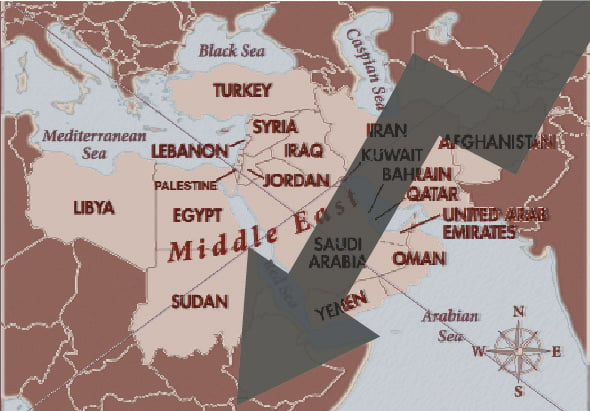Strategizing from 7 cities across the globe
Invading the Open Trade: What would the war on Lebanon signify for MENA commerce
The current artillery exchange between Lebanese militias and the Israeli defense forces is rising up as global news started discussing ground invasion. However, the consequences of such actions would lead to critical damage, as Israeli authorities failed to take into account the meaning of war within Middle Eastern trade and what that invasion would induce.
WARMIDDLE EASTTRADEECONOMICS
Elie Joe Akiki, Joe Hage
10/17/20245 min read


For decades, the Lebanese curriculum has taught about the importance of Lebanon’s location, being the gem linking the East and West, and a checkpoint for international trade. While this statement is rather outdated and particularly hyperbolic, we cannot deny the peculiar importance of the Lebanese customs and trade routes. The fast recovery of the Beirut port after the 4th of August explosion reflects the regional interest within Lebanese trade, but it is constantly threatened within the MENA scheme. Currently, the war on Lebanon has been detrimental for the local economy, displacing millions of people and ruining infrastructure within various regions of the country. On top of that, the overall mass killing of innocents has led to second thoughts about visiting the country or even exporting towards the location. The current artillery exchange between Lebanese militias and the Israeli defense forces is rising up as global news started discussing ground invasion. However, the consequences of such actions would lead to critical damage, as Israeli authorities failed to take into account the meaning of war within Middle Eastern trade and what that invasion would induce.
As many economists have admitted, Lebanon does not possess various natural resources or means of production to rely on in order to boost the economy. However, it became a major hub for services and trade, where the supply of shipping and transit agencies skyrocketed, becoming a total of 9% of the country’s GDP in 2023 (IMF). Syrian companies became the primary users of Lebanese dockyards due to the faster pace and general efficiency. It is also worth mentioning the rather cleaner picture that Lebanon possesses, as goods coming from Beirut or Tripoli are less prone to extreme investigation compared to Latakia or Tartus. Overall, the high supply of transit service in Lebanon made exporting costs minimal, thus leading to a higher worldwide demand for Middle Eastern goods coming through Lebanon. Furthermore, in terms of imports, the main checkpoint within the Mediterranean region has been Beirut because of its low customs duties.
Now let us consider what an invasion would imply for these benefits. While the tax rates would still be the same, companies that are willing to export towards the MENA region, especially in the near Mediterranean, would have to account for the “War Risk Premium”, which would indicate an increase of prices based on the expected rate or return. Suppose a ship would like to cross the EEZ of the region, which is rather hostile and has an increased probability (p) of getting sunk. This would cost the whole ship (S) as well as the revenue coming from this transaction (X). In a safe scheme, we would have an expected return of X.
However, in a hostile scenario, E[X]= (1-p)X - p*S will lead companies to raise their prices if they have to cross the eastern mediterranean, resulting in a rise in prices for imports crossing the Suez Canal, and thus an indirect implication on the port of Jeddah, the core of Saudi trade. One major sector that would be affected is the jewelry market, as the UAE is filled with diamonds imported from Lebanese manufacturers. Since they will not be able to send out their merchandise, a shortage will develop within the country. The UAE imports approximately 1-billion-dollar worth of jewelry from Lebanon every year, a considerable supply that is at high risk due to the regional hostilities.
The ongoing conflict between Israel and Lebanon has profound repercussions for ground transport across the Levant, particularly affecting Syria, Iraq, Jordan, and Saudi Arabia. Lebanon, though small, serves as a crucial transit hub for raw materials, energy, and goods which are vital for local economies. Prior to the struggle, Lebanon's ports, particularly in Beirut and Tripoli, facilitated over 1 million TEUs (twenty-foot equivalent units) annually. However, the threat of an invasion raises fears of closures and disruptions that would choke off trade routes not just for Lebanon, but also for its neighbors reliant on these passages for vital supplies. For instance, Jordan, which imports a significant portion of its goods through Lebanon, could see an escalation in prices and shortages, especially in essential items like food and fuel, as ground transport routes become increasingly hazardous. Moreover, the urgency of the situation is underscored by Lebanon's dire economic state—reportedly, 80% of the population lives below the poverty line, and inflation has skyrocketed to 138% in 2023. An invasion would not only disrupt these transport networks but could also exacerbate an already fragile economy, pushing Lebanon closer to a humanitarian crisis.
Furthermore, the potential ramifications extend beyond immediate trade disruptions to the broader energy market. The Middle East is home to approximately 48% of the world’s oil reserves, making stability in this region paramount for global energy supplies. Any military escalation could prompt blockades or increased tensions in key chokepoints like the Strait of Hormuz and Bab el-Mandeb which are crucial for global oil shipments. Historical precedents, such as the 1973 Yom Kippur War, demonstrate how military hostilities in this region can trigger spikes in oil prices due to supply chain disruptions. With Lebanon's energy sector already vulnerable, any conflict would likely send shockwaves through oil markets, potentially inflating prices further and complicating the global energy landscape. This would impact Europe in particular, as it is already grappling with shifting energy policies following the Russia-Ukraine war. Additionally, disruptions to the Suez Canal, which facilitates about 12% of global trade, could lead to increased shipping costs and longer delivery times as vessels are rerouted. As insurance premiums for shipping companies surge in response to the conflict, the cascading effect would be felt by consumers around the world, emphasizing the interconnectedness of regional stability and global commerce. The safety and stability of Lebanon remain critical not only for its own recovery, but for the health of MENA commerce as a whole, emphasizing the urgent need for peace in the region.
In conclusion, if any individual in the Middle East has been careless about the mass murder currently happening in Lebanese areas, here are the consequences of this fire exchange. The escalation of the war would be an economic downturn for the Arab countries, especially since the Arab league has been making progress within specialization and constant trade. One change might create a whole domino effect, resulting in an economic recession and inflation within the region. External costs and the possibility of war damages which are taken into account within exports costs would lead to an inflation. Even more chaos might spread to a commerce checkpoint, the stamp of middle eastern investigation would become hypocritical, and the total NX demand would decrease. The open trade would be threatened, and the closed economy would not be beneficial for neither the MENA region, nor the rest of the world. As aggressions keep on going on with no hint of ceasefire, it is necessary to consider that more individuals across the region would be harmed by the hostilities. In the end, this is the meaning of war in terms of trade, and the detriments are drastic. Let us learn from the fate of the millions of people who already got the taste of war.
References
Columbia World Projects. Rebuilding Beirut: A Report on Recovery and Reconstruction in the Aftermath of the 2020 Port Explosion. Columbia University, Feb. 2023. Columbia World Projects,
International Monetary Fund. Lebanon: 2023 Article IV Consultation-Press Release; Staff Report; and Statement by the Executive Director for Lebanon. IMF, Sept. 2023,
Lebanese Customs Administration. Customs Law. Lebanese Customs
World Bank. "Customs and Other Import Duties (% of Tax Revenue) - Lebanon." World Development Indicators, World Bank
Zoughaib et.al. “Unpacking Lebanon’s Trade Amid the Crisis” . The Policy Initiative, 2022
